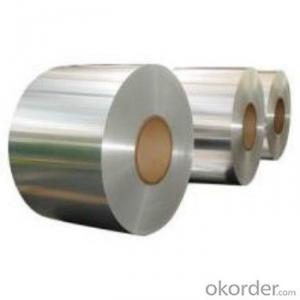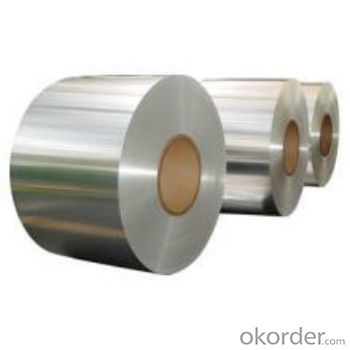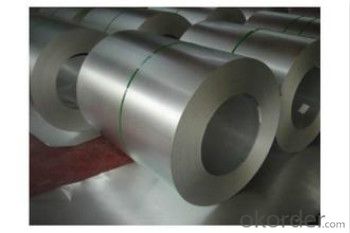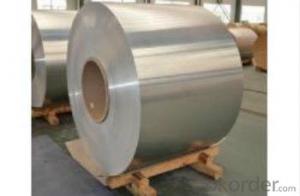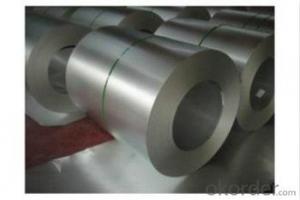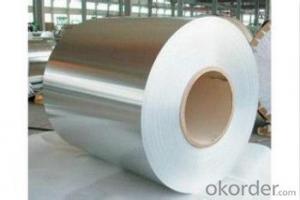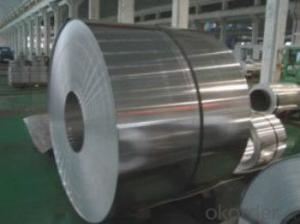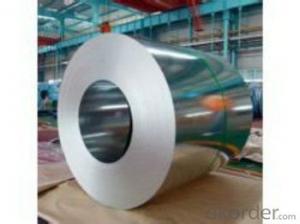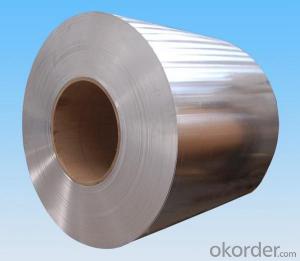Aluminum Coil Fins Mill Finished Aluminium Coil AA1050 Temper H18
- Loading Port:
- Tianjin
- Payment Terms:
- TT OR LC
- Min Order Qty:
- 5 m.t.
- Supply Capability:
- 3000 m.t./month
OKorder Service Pledge
OKorder Financial Service
You Might Also Like
Specification
1. Aluminum Coil Description:
Aluminum coil, is a rolled product, produced in a coiled form of continuous strip, and having an ID (Inner diameter) and OD (Outer diameter).Common alloy coil are used for a wide variety of applications, alloy 1050, 1060, 3003, 3105, 3005, 5052, 5754, 5083, 6061, 8011, 8021, and so on, in thickness from 0.0065-7mm, in width from 300- 2200mm.
2.Main Features of the Aluminum Coil:
• Great ductility
• Heat conductivity
• Anti-corrosion
• Moisture resistanve
3.Aluminum Coil Images
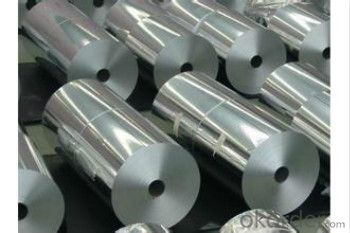
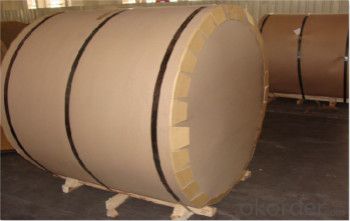
4.Aluminum Coil Specification
Aluminum Coil/Sheet | |
Main Specification | |
Alloy | AA1xxx (AA1050, AA1060, AA1070, AA1100 etc.) |
AA3xxx (AA3003, AA3004, AA3005, AA3105 etc.) | |
AA5xxx, AA6XXX (AA5052,AA5083, AA5754, AA6061, AA6062 etc.) | |
AA8xxx(AA8011, AA8006, AA8079 etc.) | |
Temper | H14,H16, H18, H22, H24, H26, H32,O/F |
Thickmess | ≥0.2mm |
Width | 30mm-2100mm |
Standard | GB/T 3880-2006 |
Special specification is available on customer's requirement | |
5.FAQ
We have organized several common questions for our clients,may help you sincerely:
(1) How to guarantee the quality of the products?
We have established the international advanced quality management system, every link from raw material to final product. we have strict quality test; we resolutely put an end to unqualified products flowing into the market. At the same time, we will provide necessary follow-up service assurance.
(2) MOQ?
For trail order, we accept 5 MT.
(3) Payment term?
30% deposit, balance against the BL copy; 100% L/C at sight
(4) What is the delivery time?
Depends on actual order, around 30 to 35 days
- Q: Is it possible to create baskets or containers using aluminum coils?
- <p>Yes, aluminum coils can be used to make baskets or containers. Aluminum is a lightweight, durable, and malleable material that can be easily shaped and bent into various forms. It is commonly used in manufacturing due to its strength and resistance to corrosion. For baskets or containers, aluminum coils can be woven or molded into the desired shape, offering both functionality and aesthetic appeal. However, it's important to consider the thickness and gauge of the aluminum to ensure the structure's stability and durability for its intended use.</p>
- Q: The user is asking if there are any recycling programs specifically for aluminum coil in their country.
- <p>Yes, many countries have recycling programs for aluminum coil. These programs aim to collect and recycle aluminum coils to reduce waste and conserve resources. The availability and specifics of these programs can vary by country, so it's best to check with local waste management authorities or recycling centers for information on programs in your area. Some countries also have legislation mandating recycling of certain materials, including aluminum, to encourage participation and reduce environmental impact.</p>
- Q: Its got probably 330 horses right now with aluminum heads what do you think it be approx.
- The material is not what establishes the performance. It is the shape, design, and volume of air flow through the ports. Editorial: If this persuit is all about the hobby--- have fun. Don't expect to make your money back on this car if you ever sell it though. In fact such modifications may reduce resale value. Editorial ended. Aluminum is easier to machine than cast iron and this is the biggest reason you find some high-performance heads in aluminum. A completely special designed part can be more easily machined, even from solid aluminum billet. Cast iron usually requires compromise in terms of being able to actually cast the raw part itself with roughed out shape in the sand mold. Even then if aluminum is sand-cast it is still easier to machine and clean up-- especially for low volume production. So you see many high-perf heads are aluminum. Its not the aluminum that does the job--- it is the design itself. Aluminum has better thermal conductivity for cooling, but that is not always an advantage when matching up to a cast iron block. It is a side consideration-- the shape of the combustion chamber and valve position and ports is what gets it done. Some engine makes have very good cast-iron performance heads that are factory proven and usually less trouble (like leaking head gaskets and all) than similar aluminum heads. Depending upon the make of engine you are working with, there are books, parts lists, and so on for various build-ups for performance. They list part numbers, advantages and disadvantages and so forth. Do a search on-line and it will be worth it to have the reference in hand. Summit Racing might be one place to start. If you have a particular part in mind, you can find the original specs from the manufacturer with some guidance to compare to their other parts and what are the advantages-disadvantages.
- Q: What are the potential health risks associated with working with aluminum coils?
- Working with aluminum coils can pose certain health risks to individuals. One of the primary concerns is the potential for exposure to aluminum dust or fumes. Inhalation of aluminum dust or fumes may lead to respiratory issues such as coughing, shortness of breath, and asthma-like symptoms. Prolonged or excessive exposure to aluminum dust may also result in a condition known as aluminum pneumoconiosis, which can cause lung scarring and impair respiratory function. Additionally, aluminum is a neurotoxic substance, and prolonged exposure to high levels of aluminum may lead to neurological disorders. Studies have suggested a possible link between aluminum exposure and conditions like Alzheimer's disease, although further research is needed to establish a definitive causal relationship. Another potential health risk associated with working with aluminum coils is the risk of skin irritation. Aluminum is known to cause contact dermatitis in some individuals, resulting in redness, itching, and inflammation of the skin upon direct contact. It is important for workers to take necessary precautions such as wearing protective clothing and gloves to minimize skin exposure. Furthermore, working with aluminum coils may involve the use of chemicals such as lubricants, solvents, or cleaners, which can also pose health risks. These chemicals may have their own set of hazards, including skin irritation, respiratory irritation, and in some cases, long-term health effects such as organ damage or cancer. In conclusion, while working with aluminum coils offers numerous benefits, it is crucial to be aware of the potential health risks associated with this type of work. Employers and workers should take appropriate safety measures, such as wearing personal protective equipment, implementing proper ventilation systems, and following best practices to minimize exposure and mitigate any potential health hazards. Regular monitoring and medical check-ups may also be advisable for those regularly exposed to aluminum coils to ensure early detection and prevention of any adverse health effects.
- Q: What is the typical fatigue strength of aluminum coils?
- The typical fatigue strength of aluminum coils varies depending on various factors such as the alloy used, the manufacturing process, and the specific application. However, in general, aluminum coils have relatively high fatigue strength compared to other materials, making them suitable for applications where repeated cyclic loading is involved.
- Q: How are aluminum coils used in electrical applications?
- Due to their advantageous properties, aluminum coils find wide application in various electrical uses. Transformers, motors, and inductors are the primary domains where these coils are employed. Transformers utilize aluminum coils to facilitate the transfer of electrical energy from one circuit to another. These coils are wrapped around a magnetic core, thereby facilitating efficient energy transfer. Aluminum coils are preferred over copper coils in transformers due to their affordability, light weight, and superior conductivity. Moreover, aluminum coils exhibit higher thermal conductivity, enabling better heat dissipation. This feature is crucial for maintaining transformer efficiency and longevity. In motors, aluminum coils serve as the winding material for the stator, which is the stationary component of the motor. By passing an electrical current through the coils, a magnetic field is generated. This magnetic field interacts with the rotating magnetic field produced by the motor's rotor, resulting in motor rotation. Aluminum coils are favored in motors due to their lightweight nature, contributing to overall motor efficiency by reducing its weight. Inductors, another electrical component, employ aluminum coils. Inductors store electrical energy in the form of a magnetic field. When an electric current traverses the coil, a magnetic field is generated, which opposes changes in the current. Aluminum coils are utilized in inductors owing to their high electrical conductivity, facilitating efficient energy storage and release. In summary, aluminum coils are extensively used in electrical applications due to their cost-effectiveness, lightweight nature, excellent conductivity, and high thermal conductivity. Their application in transformers, motors, and inductors plays a pivotal role in ensuring efficient and reliable operation of electrical systems.
- Q: This question asks for the various uses of aluminum coil within the construction industry.
- <p>Aluminum coil has several applications in construction due to its lightweight, durability, and resistance to corrosion. It is commonly used in roofing and siding materials for both residential and commercial buildings. Aluminum coil is also utilized in the manufacturing of window frames and doors due to its strength and ability to withstand harsh weather conditions. Furthermore, it is used in the production of heat exchangers and HVAC systems because of its thermal conductivity. Additionally, aluminum coil is employed in the construction of scaffolding and temporary structures due to its ease of handling and high strength-to-weight ratio. It also finds use in the fabrication of electrical conduits and cable trays because of its electrical conductivity and resistance to moisture.</p>
- Q: Can aluminum coils be used in the production of automotive heat shields?
- Yes, aluminum coils can be used in the production of automotive heat shields. Aluminum is commonly used in heat shields due to its excellent thermal conductivity and lightweight properties. It helps to effectively dissipate and reflect heat, making it a suitable material for this application.
- Q: i have recently received a task to research the recycling processes of aluminum ..... the task also asks to STATE ALL RELEVANT MATHEMATICAL OR/AND CHEMICAL EQUATIONS ...when i researched the task i found how aluminum is recycled, but i couldnt find the relevant equations ...can you please help meall answers are really appreciated
- Aluminum okorder /
- Q: Are aluminum coils suitable for beverage can manufacturing?
- Yes, aluminum coils are suitable for beverage can manufacturing.
Send your message to us
Aluminum Coil Fins Mill Finished Aluminium Coil AA1050 Temper H18
- Loading Port:
- Tianjin
- Payment Terms:
- TT OR LC
- Min Order Qty:
- 5 m.t.
- Supply Capability:
- 3000 m.t./month
OKorder Service Pledge
OKorder Financial Service
Similar products
Hot products
Hot Searches
Related keywords
